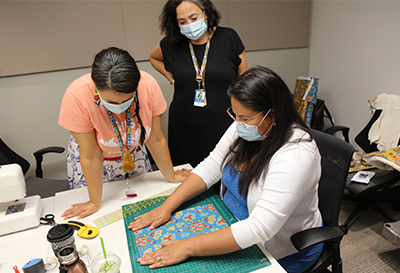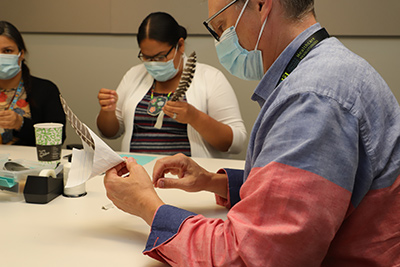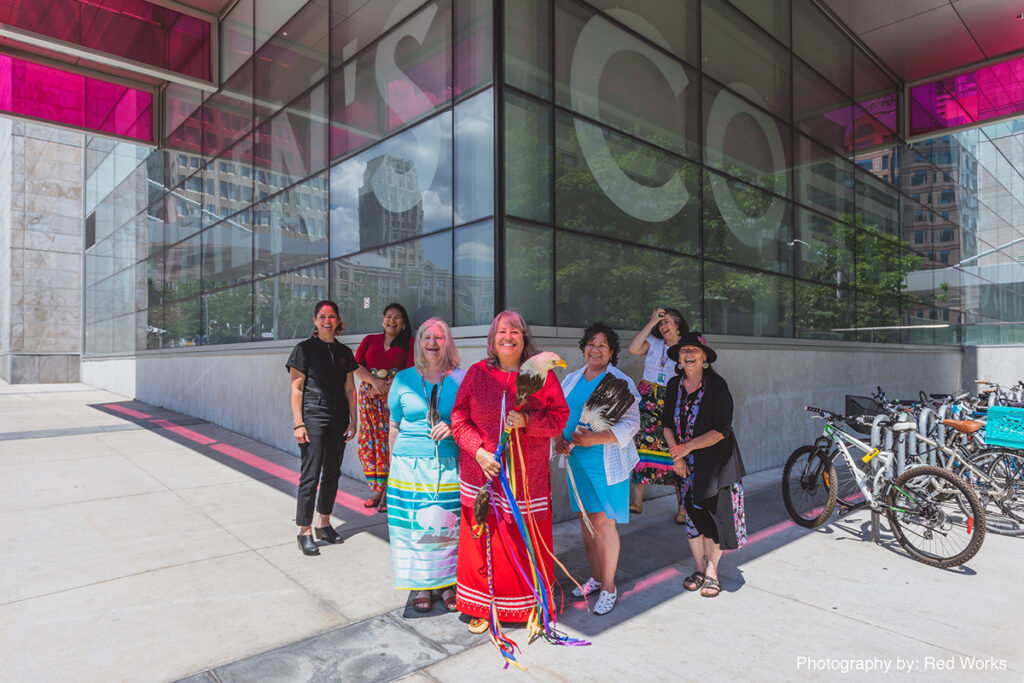BY WCH Staff with contributions from The Centre for Wise Practices in Indigenous Health


The Centre for Wise Practices in Indigenous Health (CWP-IH) is committed to providing access to traditional medicines and healing practices for Indigenous community members and frontline workers at Women’s College Hospital (WCH). CWP-IH team members, Knowledge Keeper and Darryl Yates, Vice-President of Patient Care & Ambulatory Innovation, gathered weekly throughout August and continuing into September for traditional beading and sewing circles in preparation for gifting WCH clinics with sacred medicine bundles (.pdf). The bundles will include dressed Turkey feathers, feather cases and medicine pouches containing the four sacred medicines (.pdf) and abalone shells for smudging.
Over time, CWP-IH will be presenting these bundles and complimentary education/medicine care workshops to WCH clinics that the CWP-IH has inter-organization relationships with and clinicians in those areas who have undergone additional Indigenous-specific trauma informed, cultural safety and anti-racism training. Due to COVID-19 restrictions, a small private feasting ceremony (.pdf) will be held virtually. The following clinics and departments will be participating:
- COVID-19 Assessment Centre
- Bay Centre
- Family Practice Health Centre (FPHC)
- Mental Health
- Sexual Assault/Domestic Violence Care Centre (SA/DVCC)
- Substance Use Service / RAAM
“Education plays a crucial part in reconciliation. It was the education system that contributed to the residential school legacy so it will be the education system that will help repair it.”
~Senator Murray Sinclair
“Smudging really grounds me and brings me back to a connection of place with creator and I feel close to my ancestors. I ask them to help with the work I’m doing to ensure I’m doing moving forward in a good way. Without that good smudge and that grounding, that connection is gone.
When you have that smudge, it’s like your telephone, it’s your opportunity to connect with your ancestors and creator.
Other Indigenous peoples will have their own teachings and perspectives, but for me and as I’ve been taught, it’s about protection and connection.”
~Rosary Spence, WCH Knowledge Keeper
The bundle-making gatherings/circles were planned to align with the anniversary of the United Nations Declaration on the Rights of Indigenous Peoples (UNDRIP), as this year, in particular, falls on September 13th — coinciding with the mapping of the moon cycle — which happens 13 times each year. There are many teachings associated with the moon cycles, markedly connections to Grandmother Moon, Womxn and Water being life nurturers and givers. UNDRIP is “the most comprehensive international instrument on the rights of Indigenous peoples. It establishes a universal framework of minimum standards for the survival, dignity and well-being of the Indigenous peoples of the world and it elaborates on existing human rights standards and fundamental freedoms as they apply to the specific situation of Indigenous peoples.”

~Cindy Blackstock, Executive Director, First Nations Child and Family Caring Society of Canada
Additional information and resources related to UNDRIP:
- UNDRIP (.pdf)
- Article 11.1
Indigenous peoples have the right to practice and revitalize their cultural traditions and customs… - ARTICLE 12.1
Indigenous peoples have the right to manifest, practice, develop and teach their spiritual and religious traditions, customs and ceremonies… the right to the use and control of their ceremonial objects… - Article 24.1
Indigenous peoples have the right to their traditional medicines and to maintain their health practices, including the conservation of their vital medicinal plants, animals and minerals. Indigenous individuals also have the right to access, without any discrimination, to all social and health services.
- Article 11.1
- UNDRIP resource for youth and young people aged 13 –18 years (.pdf)
“Infrastructure Ontario, the agency which oversees public/private partnership projects, does not include infrastructure, facilities or maintenance specs for smudging. Paradoxically, organizations can be fined $10 000 according to Section 1.1 of the Ontario Human Rights Commission, for not accommodating the practice.”
~Dr. Lisa Richardson, WCH Lead of Indigenous Health